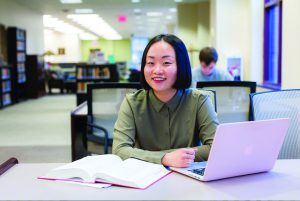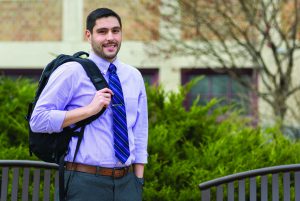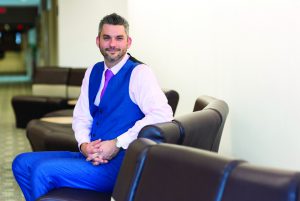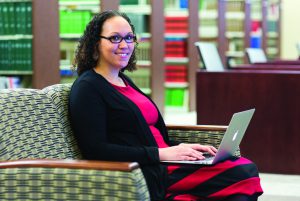For a combined total of more than 150 years, Hamline Law and William Mitchell each attracted a diverse group of highly motivated and accomplished students to prepare for careers in law. Mitchell Hamline is doing the same.
What follows are short profiles of four—one each in our full-time, part-time evening, weekend, and HYBRID J.D. programs—from a variety of backgrounds and with a variety of interests and career goals who sought out Mitchell Hamline for the unique opportunities it provides.
Hannah Yi
Hannay Yi knew she wanted to be an attorney after her family faced a tense situation.
Yi was studying for finals during her senior year at Seattle Pacific University when her father called from Virginia. He told Yi her mother had been falsely accused of check fraud and was being arrested. Because her parents speak mostly Korean, Yi stepped in to translate the conversation between her parents and police over the phone.
from Virginia. He told Yi her mother had been falsely accused of check fraud and was being arrested. Because her parents speak mostly Korean, Yi stepped in to translate the conversation between her parents and police over the phone.
A judge later dismissed the case, but the ordeal left Yi’s parents physically, mentally, and emotionally exhausted. It also made Yi realize she wanted to study the law.
“For me, becoming an attorney means being an advocate for those without a voice,” she said.
Yi’s goal is to one day become part of the U.S. Navy Judge Advocate General Corps. An internship with the JAG Corps this summer puts her one step closer to that dream.
Yi chose Mitchell Hamline because of the school’s commitment to “foster well-grounded, experienced, and professional lawyers” by providing hands-on legal experience to students. Yi said her Mitchell Hamline professors have gone above and beyond to help her toward her goal of becoming an attorney.
“I did a lot of research prior to attending law school,” Yi said. “I felt that Mitchell Hamline would offer me the best education, mentorships, and opportunities to set the foundation of my path to becoming a lawyer.”
Nathan Hines
For Nathan Hines, Mitchell Hamline’s weekend J.D. program is a perfect fit for an already busy life.
“I chose the weekend program because it allowed me to maintain my full-time job, interact with faculty and students in a classroom setting, and prevented a three hour round-trip every day,” Hines said.
Hines, who grew up in Colorado, moved to Minnesota in 2009 to pursue a certificate in Medical Laboratory Sciences from the Mayo Clinic in Rochester. After completing the program, he was hired full-time in the Metals Laboratory at Mayo, where he diagnosed diseases by testing patient samples. He set up a mentorship program to support future students as they entered the training program. Hines has since transitioned to a coordinator role in the lab, working with clients around the world who send specimens to Mayo for analysis.
Hoping to learn more about how the law affects his profession, Hines earned a Master of Jurisprudence in Health Law from Loyola University in Chicago in 2013.
He sees a J.D. from Mitchell Hamline as the obvious next step in his health care career.
“My ultimate hope is that I’m able to remain at Mayo Clinic in some capacity to practice law,” Hines said. “Whether that is in-house counsel, or a position that is J.D.-preferred, the critical thinking and analytical reasoning skills I have obtained will serve me well in any position at the Mayo Clinic.”
Christian Schoepp
Foreign service has always been a part of Christian Schoepp’s life.
Schoepp was born in Montreal but grew up around the world, especially Africa, where his father’s career took the family. After high school, he attended college in Florida and then served as a staffer for the U.N. General Assembly. Schoepp earned a Ph.D. in conflict analysis and resolution, then took a position with the  Canadian government in 2011 and has since worked as the senior consular officer at the Consulate General of Canada in Miami.
Canadian government in 2011 and has since worked as the senior consular officer at the Consulate General of Canada in Miami.
As a representative for Global Affairs Canada, he helps Canadian citizens staying in Florida, Puerto Rico, and the Virgin Islands sort out legal trouble.
Schoepp is working on expanding his knowledge of the law in Mitchell Hamline’s HYBRID J.D. program. The part-time, on-campus and online program is an ideal option for Schoepp, a father and husband with a full-time career involving lots of travel and more work on the side as a doctoral professor at a local college.
“This program is the only way for me to go to law school,” he said.
Because of his work, Schoepp entered the program with a solid base in the law, but has found the work rigorous.
“There’s nothing in terms of life experience that will train you to write a summary judgment motion,” he said.
After he graduates from Mitchell Hamline, Schoepp wants to continue doing his work in international legal affairs and conflict resolution, perhaps with the International Criminal Court.
Tasha Gandy
As an undergrad at Metropolitan State University in St. Paul, Tasha Gandy started a campus chapter of Students for Education Reform, a group dedicated to finding solutions to the achievement gap facing students of color and low-income students.
“I realized quickly that I enjoyed civic engagement and giving back,” Gandy said. “It made me motivated to get up every morning.”
After she graduated, Gandy was hired by the group’s national organization as its first Minnesota program director. In a few years, she became the state chapter’s executive director and began to build the organization’s current staff of six employees.
In 2015, Gandy was one of 23 people chosen for a Bush Foundation Fellowship, a two-year program that works to strengthen community leaders. Fellows receive funding to build on their leadership skills either through a self-designed plan or by furthering their education.
Gandy used the first year of her fellowship to study best practices for organizing parents to tackle the achievement gap and her second year to attend Mitchell Hamline. She’s now in the part-time evening program, the flexibility of which has allowed her to keep working while going to law school.
“I wasn’t at a point in my life and career where I could step away from work,” Gandy said.
Once she earns her J.D., Gandy wants to advocate on behalf of families facing challenges within the education system, whether at the school, district, or state level. She also wants to get involved in drafting legislation that could help close the achievement gap.
